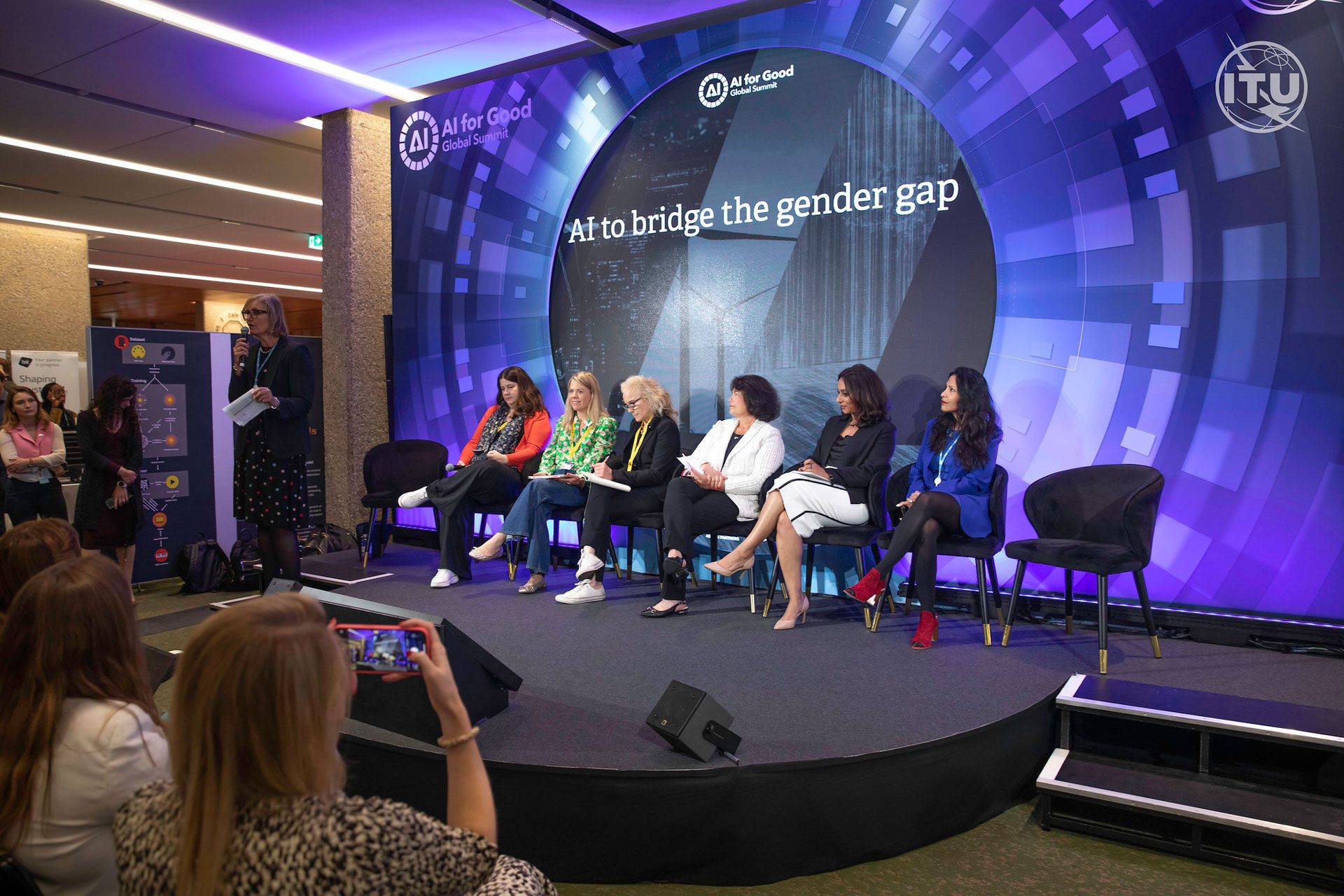
Inclusive, responsible AI needs women front and centre
ITU News
The artificial intelligence (AI) industry needs diverse women’s perspectives to improve the design and application of the latest technologies, say digital experts concerned about AI deepening the gender divide.
Women from all world regions, not just the Global North, can help shape and monitor AI tools and systems to make sure the technology is inclusive and responsible.
“We need women at the table, and we need to start now,” urged Doreen Bogdan-Martin, Secretary-General of the International Telecommunication Union (ITU), opening a recent AI for Good Summit session on bridging the gender gap with AI.
Women represent just 22 per cent of the world’s AI workforce today, mirroring their under-representation across the whole technology field. But prioritizing gender equality is not just about increasing women’s participation or ensuring their safety.
Women’s involvement can help make AI systems more inclusive for all marginalized groups, rather than simply reflecting or magnifying inequalities, said experts at the ITU-hosted discussion in Geneva, Switzerland.
Initiatives to drive gender equality in technology include supporting women-led start-ups, empowering the next generation with learning opportunities, and providing future skills workshops, training, and pro bono support to women entrepreneurs, said Laura Turkington, Commercial and Innovation Leader for Global Corporate Responsibility at EY.
EY and ITU have set out to train 1 000 girls across 12 countries in AI and entrepreneurship, enabling girls to develop entrepreneurial technology-based solutions.
Cosmas Luckyson Zavazava, Director of ITU’s Telecommunication Development Bureau, noted: “The new ‘AI skills accelerator for girls’ project, launched in collaboration with EY, will provide girls and women with digital, ethical and managerial skills to become content creators and boost creativity and innovation.”
Diversity in digital transformation
Placing women front and centre in AI is essential to ensure equity, accountability and inclusivity, particularly as new systems are deployed in the context of existing social, cultural, and economic disparities.
“This is not just about the participation of women or the safety of women,” asserted Helene Molinier, Senior Advisor on Digital Cooperation at UN Women. “This is about digital transformation in a world with a big deficit in gender equality.”
For now, she added: “AI systems are reinforcing gender bias.”
Developers need to tackle those embedded biases and introduce new AI tools based on data sets and algorithms that reflect the perspectives of the many, not the few, the panel agreed. Human rights impact assessment tools can help to correct bias, both before an AI system hits the market and after.
“We consider gender equality to be a democratic issue, and who makes the tools to be a feminist issue,” said Caitlin Kraft Buchman, CEO and Founder, Women at the Table, and Co-Founder, Alliance for Inclusive Algorithms.
Marginalized groups need to be involved in co-creation from the very start of the process, rather than just consulted after tools are developed. Furthermore, their involvement must continue as part of a life cycle approach, given how AI continually evolves.
“Diversity is nothing new,” added Aileen Black, President at Groq, an AI inference technology builder. “It makes good business sense to have a diverse executive team. But with the blistering speed of technology and AI innovation in particular, diversity is foundationally critical.”
Move slow and build things
Addressing bias in existing AI systems is difficult. It depends on understanding where data is coming from, interrogating large data sets, and disaggregating data so that models can be re-weighted.
“We need a pause to course correct, fix the tech, reign it in, and then move forward as we want to, not blindly,” said Kraft Buchman.
Mia Shah-Dand, founder of non-profit Women in AI Ethics and CEO of emerging tech consultancy Lighthouse3, agreed: “The old model was to move fast and break things. We are now in the era of responsible AI: Move slow and build things.”
Everyone can have a role in AI advancement, from data scientists and technology specialists to designers, social scientists, and human rights workers – and, of course, women founders building tech companies. Shah Dand said.
About tech entrepreneurs like herself, she added: “We are the originals. We built the foundation for computing. We are not going anywhere. If you are a founder in AI, you are building the future of AI.”
Mirroring the world
Inevitably, digital disparities for women parallel wider global disparities. The digital gender gap, said Sharmista Appaya, Global Lead on AI and Data Innovation at the World Bank, overlaps with another, broader gap – between people in developed markets, who are a global minority, and the majority living in the underserved Global South.
International organizations can ensure all voices are heard, as well as mobilizing technical assistance, digital skills training, and funding to implement gender-inclusive policies throughout the AI value chain, according to Appaya.
At the user end, AI systems can help drive financial inclusion for women, who make up 60 per cent of the global unbanked population, she noted. For example, AI can reduce barriers to access and usage, as well as aid in identifying and creating the right types of financial products for different customer groups.
According to Kraft Buchman, major international discussions and framework agreements around AI, such as the anticipated UN Global Digital Compact, also need gender at the core, anchoring AI governance in terms of existing human rights frameworks.
“Let us keep ensuring gender is at the heart of the Global Digital Compact and use the Geneva landscape and UN agencies to focus on AI as a socio-technical activity that requires the entire world, with every discipline involved,” she concluded.
Black agreed: “AI can be a game-changer: it democratizes knowledge and capabilities. AI is our opportunity to close the gap.”
